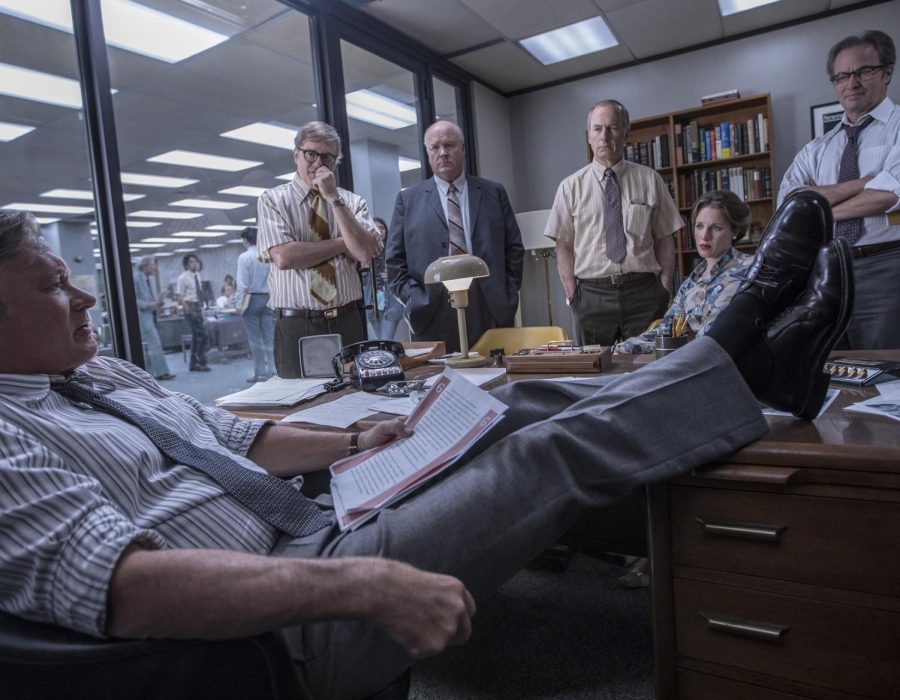‘The Post’ delights, informs, inspires
“The Post,” directed by Steven Spielberg, has received positive reviews from critics and currently carries an 88 percent approval rating on Rotten Tomatoes.
Jan 18, 2018
Set against the politically turbulent backdrop of the Nixon administration, “The Post” is a late career highlight for legendary director Steven Spielberg that serves as a potent reminder of the immeasurable value a free press carries in the fight for democracy, truth and justice.
The film, which takes place in 1971 during the United States’ involvement in the Vietnam War, follows Kay Graham (Meryl Streep), the publisher of The Washington Post, and Ben Bradlee (Tom Hanks), the paper’s hard-nosed editor, as they are faced with a moral and ethical dilemma regarding their decision to publish classified documents that reveal the U.S. government’s history of deceit in the war.
Directing: 5/5
Although the real-life story that inspired “The Post” carried far-reaching historical implications, the events themselves that comprise the titular newspaper’s landmark publishing decision are decidedly small in visual scope.
Knowing this, Spielberg deliberately emphasizes the seemingly ordinary in “The Post” by injecting his trademark flair for highly cinematic compositions.
Never before has a news room looked and felt so alive — so full of energy, tension and movement. Spielberg is able to achieve this unique sense of dynamism by opting for intricate tracking shots that allow his camera to freely glide before resting on a static shot that reinforces the moments of indecision that puncture through the film’s otherwise rattling pace.
Finally, it should be noted that longtime Spielberg collaborator and cinematographer Janusz Kaminski puts forth some of the best work of his career, using light and shadows to imbue an extraordinary sense of depth and detail in many of Spielberg’s carefully crafted compositions.
Writing: 4/5
With a captivating real-life story as its basis, “The Post” boasts one of the best paced and most purely enjoyable screenplays for a political thriller in recent memory.
Written by Liz Hannah and Josh Singer, the film’s screenplay doesn’t allow itself to get bogged down by the extraneous details and narrative padding that so often accompany historical dramas like “The Post.” Instead, the film quickly arrives to the main thrust of its story, much like the efficiency with which many of the film’s featured journalists go about their work.
And yet, despite the film’s brisk pacing, “The Post” never skimps on historical context or character development. Indeed, much of the film’s ensemble cast come across as multi-dimensional and personable, rather than the detached historical figures these very real people may likely be reduced to in the future.
Finally, if there is any criticism one can make with the narrative presentation of “The Post,” it’s that its central theme does feel somewhat blunt at times. To be sure, the film would have benefitted from a touch more subtlety, but its universal message of moral responsibility is one of nearly unavoidable predictability.
Acting: 4/5
Led by veterans Hanks and Streep, “The Post” also benefits from a truly impressive ensemble cast that adds depth and nuance to the film’s already considerably exciting fact-based story.
Tom Hanks is characteristically committed to his character, bringing a delicate sense of concern to his newspaper editor’s stereotypically tough exterior. Notwithstanding an admittedly inconsistent East Coast accent, Hanks turns in what is likely his best performance since 2013’s “Captain Phillips.”
Meanwhile, Streep is a powerhouse as Kay Graham, who is at her best in “The Post” when she’s standing up for her family paper’s legacy and for her own legitimacy as a woman in a traditionally male-dominated industry.
Still, Streep’s otherwise rock steady performance does devolve into a few moments of excess, in which the legendary actress’s technical prowess momentarily derails opportunities for authenticity and vulnerability.
Among the many other standouts is Bob Odenkirk as Ben Bagdikian, one of the reporters who was directly involved in the acquisition of the highly classified Pentagon Papers.
Odenkirk, in a role that appears to borrow from his most well-known screen persona as Saul Goodman from “Breaking Bad,” incorporates Goodman’s dry wit and cunning resourcefulness along with a surprising amount of compassion.
Overall: 4.5/5
Featuring typically gripping performances by Hanks and Streep, a taut and tightly constructed screenplay and some of Spielberg’s best directing of this decade, “The Post” succeeds as both an enlightening history lesson and as a thoroughly enjoyable political thriller.
As technically masterful as it is thematically poignant, “The Post” most impressively delivers a message of honesty and responsibility that is sure to delight, inform and inspire.









